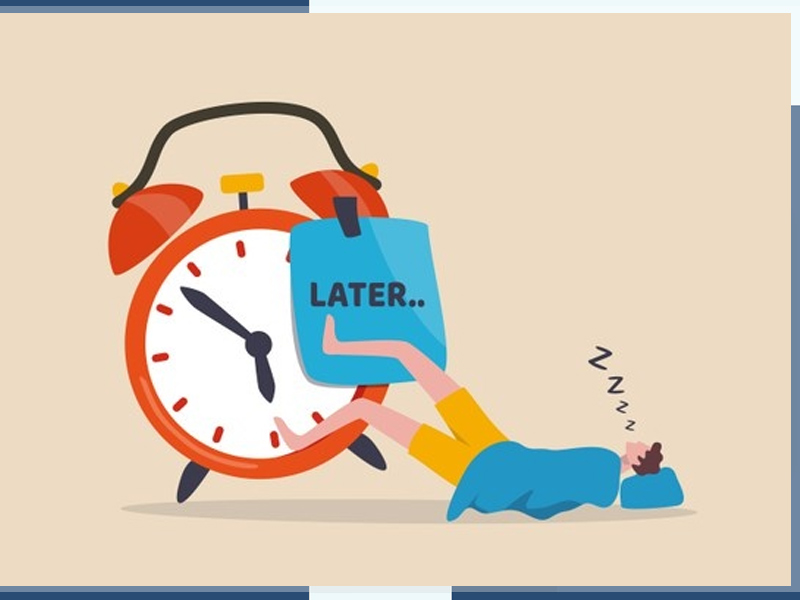
You need to study for an upcoming exam, but instead, you start reading an article on the internet, then another one, and then one more until you exhaust a large amount of your time. Or, you have that report to finish, but you instead start replying to those emails, which could have been done later on. If you are familiar with these scenarios, you must be familiar with a term called ‘procrastination’. The Merriam-Webster dictionary defines it as “to put off intentionally the doing of something that should be done”. In other words, procrastination can be simply defined as putting off doing the thing at hand to do something less important, such as checking social media, cleaning your almirah, replying to those emails. On the face of it, procrastination appears similar to laziness. But is this really the case?
Table of Content:-
Is Procrastination Same As Laziness?
The answer is ‘no’. In the case of laziness, a person, even though completely able, is disinclined to do a particular task because of the effort involved. Procrastination, meanwhile, has much to do with emotions. As per a leading news website, a person procrastinates to deal with negative emotions, such as boredom, anxiety, self-doubt, resentment, associated with a negative task.
As you saw, procrastination is an emotional thing, but what are the scenarios in which a person tends to procrastinate more?
- Studies: Procrastination among students is quite common so much so that a 2007 meta-analysis concluded that a whopping share of 80-95% of college students procrastinate.
- Mental Health: As per a leading health website, poor mental health, especially depression, can lead to procrastination. When you are depressed, you develop self-doubt, which can prompt you to put the task on hand on the back-burner.
How Are Procrastinators Different From Non-Procrastinators?

(Photo Credit: Freepik)
Joseph Ferrari, a psychology professor and the author of ‘Still Procrastinating: The No Regret Guide to Getting It Done’ told the American Psychological Association (APA) in an interview that non-procrastinators are more concerned about “self-esteem”, which is how they perceive themselves, rather than “social-esteem”, which is how others perceive them. A leading health website quoted psychologist Piers Steel as saying that those who do not procrastinate have more self-discipline, persistence, and are more aware of personal responsibility.
Procrastination Does More Harm Than Good
When you procrastinate, you postpone a task for a few moments of relief, only to find that same task staring at you in the future. But then, what you have to deal with are anxiety, guilt, along with the negative emotion associated with the task. What makes it worse is that procrastination is a vicious cycle. When you procrastinate while doing a certain task, you get instant relief, which makes you feel better, which motivates you to procrastinate in the future as well. Hence, you get caught up in a loop, which takes consistent and disciplined effort to come out of.
Also read: How To Overcome The Stress of Relocation As You Resume Office
How To Stop Procrastinating

(Photo Credit: Freepik)
Now that you know the problem at hand is not related to productivity but emotions, hence those productivity apps and tips won’t help. Rather, the solution should be an internal one. Here are some of the tips that might help:
- Forgive Yourself: First and foremost, forgive yourself for procrastinating instead of getting on that guilt trip. In fact, a 2010 study found that students who forgave themselves for procrastinating while preparing for the first exam procrastinated less while preparing for the second one.
- Show Some Compassion To Yourself: A 2012 study showed that procrastinators have high levels of stress on one hand and lower levels of self-compassion on the other. Hence, if you too fall in this category, developing self-compassion might make your going less difficult.
- Set Time Limit: If you tend to keep postponing tasks, setting a time frame and doing everything it takes to stick to it might help. Having a to-do list might be another option.
- Watch Your Thoughts: Procrastination is like a bad habit that takes time and effort to get rid of. What might help is being mindful. While doing a task, just watch your thoughts. Whenever you feel the urge to indulge in some distractions, do everything you can to resist it and stay focused.
- Minimise distractions: This is how it works. If you tend to keep off a task and instead scroll through social media, make this distraction less accessible, such as by installing the app from your phone, or setting really wrong and complicated passwords. When you create several roadblocks in the way to your distractions, you will ultimately give up and will instead focus on completing the task at hand.
Also read: How To Avoid Procrastination At Workplace?
So, these are some tips that might help you if you tend to procrastinate much.
Photo Credit: Freepik
Also watch this video
How we keep this article up to date:
We work with experts and keep a close eye on the latest in health and wellness. Whenever there is a new research or helpful information, we update our articles with accurate and useful advice.
Current Version